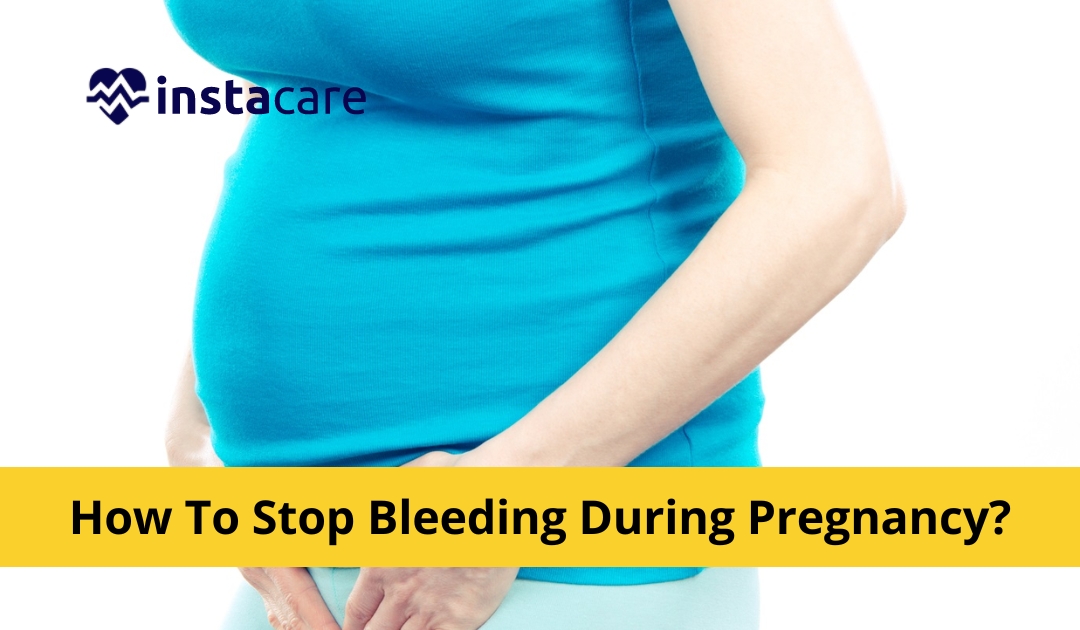In their first phase of pregnancy, many pregnant women bleed frequently. It is not harmful, but you must get the proper medical evaluation immediately. Doctors will perform a few tests to determine the causes of the bleeding or spotting and recommend the best course of action.
Are you pregnant and worried about heavy bleeding? Heavy bleeding during pregnancy is a common concern that affects many women. Thankfully, there are some natural remedies to stop the bleeding and keep your health in check. In this blog post, we'll outline some of the best methods for preventing and stopping excessive bleeding during pregnancy so that you can get back to what matters most - focusing on your baby's health. From dietary changes to herbal remedies, these tips will help you manage any kind of uterine or vaginal bleeding naturally. With knowledge comes power; read on to empower yourself and learn how to keep your body healthy throughout your journey into motherhood!
Causes of Bleeding During Pregnancy
Bleeding during pregnancy can be caused by a number of different situations. In some cases, the bleeding is due to underlying conditions such as infections, hormone changes, and cervical or uterine polyps. It can also result from placental abnormalities, pregnancy complications involving the placenta, or an ectopic pregnancy - one where the fetus develops outside of the uterus. Bleeding may also occur during the first trimester due to implantation of the fertilized egg into the uterus. Depending on its cause, some bleeding can be mild and not pose a serious risk to mother or baby while other causes are more severe and require medical attention. Taking preventative steps to ensure a healthy pregnancy can help reduce these risks.
Causes of Bleeding During the First Trimester of Pregnancy
Bleeding during the first trimester of pregnancy can be a frightening and unpleasant experience for many women. There are several causes of this bleeding, ranging from benign to more serious in nature. A common cause is implantation bleeding, which tends to be fairly light or spotting in color and occurs when the fertilized egg attaches itself to the uterine wall. Other causes include a cervical polyp, infection of the cervix or vagina, ectopic pregnancy, miscarriages and molar pregnancies. In cases where bleeding is accompanied by cramping or severe abdominal pain, it could be indicative of an ectopic pregnancy. If any of these conditions occur, medical attention should be sought immediately so that the underlying issue can be diagnosed and treated accordingly.
Causes of Bleeding During the Later Stages of Pregnancy
Bleeding during the later stages of pregnancy is an understandably concerning experience for pregnant individuals. Although not all causes of late-term bleeding are serious, it is important for pregnant people to be aware of potential causes in order to better understand their own health and care. Common reasons for such bleeding include labor starting; the breaking open (rupture) of the amniotic sac too early (premature rupture of membranes); placenta previa, which is when part or all of the placenta covers the opening of the uterus; placental abruption, which is when part or all of the placenta detaches from the wall of the uterus before delivery; cervical irritation caused by a vaginal exam or intercourse; and finally pregnancy-related infections like chlamydia or gonorrhea. Though these conditions vary in terms of risk level, pregnant individuals should discuss any worrisome symptoms with a doctor as soon as possible.
How Can Pregnancy Bleeding Be Stopped?
Most of the time, your doctor will advise you to get enough rest. They might also suggest staying away from strenuous workouts and heavy lifting. A miscarriage could occur if the bleeding lasts longer than two to three days or is very heavy. If left untreated, the pregnancy tissue left in the uterus after a miscarriage can lead to severe bleeding. Only after proper treatment will it come to an end.
View More: Why Do I Have a 10 Day Period With Light Bleeding
You may still bleed while pregnant if you do not have Rhesus (Rh) antibodies. You might need an injection of anti-D immunoglobulin in this situation. It will assist in avoiding any issues brought on by a potential blood incongruence during pregnancy.
How To Stop Bleeding During Pregnancy Naturally
If you bleed while pregnant, you need to take care of yourself.
Track Bleeding
By using a sanitary pad or panty liner, you can start keeping an eye on your bleeding. You can keep track of how much bleeding is with its aid.
Stop Additional Bleeding
Not putting anything into your vagina will stop further bleeding. Avoid using menstrual cups or tampons. Avoid engaging in sexual or douching activities while you are bleeding.
Request Support
If the bleeding does not stop, contact your healthcare provider. Visit your doctor as soon as possible and describe your symptoms to them, including any cramping, stomach pain, chills, or contractions. Mention if you are dizzy or faint as well.
It is crucial to go into detail about the symptoms. The doctor can only make a treatment recommendation in this manner. Your doctor may also request a tissue sample from your vagina for analysis.
What Causes Bleeding Most Frequently In The Second Or Third Trimester?
Contact your healthcare provider immediately, so they know your symptoms since you are three months pregnant, bleeding, and have no pain. It is frequently linked to more severe conditions.
In the second and third trimesters, the following conditions have been known to cause bleeding:
Placenta Previa
When the placenta wholly or partially covers your cervix. After 20 weeks of pregnancy, it is uncommon.
Abrupt Placentation
A rare condition in which the placenta separates from the uterine wall. This could be harmful to both you and your unborn child.
Preterm Labor
I was delivering a baby before 37 weeks of pregnancy. Other signs of preterm labor include cramping, rupturing of the membranes, and contractions. An incompetent cervix prematurely opens (dilates) and results in labor.
Gruesome Show
You may experience light bleeding and mucus near the end of your pregnancy. It might indicate that your body is getting ready for labor.
Miscarriage
A miscarriage occurs after the 20th week. This is referred to as a stillbirth.
What Distinguishes Spotting From Bleeding?
Spotting or bleeding can occur any time, from the moment you become pregnant until the moment you give birth. Light bleeding is spotting. When you have a few bloody drops on your underwear, it occurs. The blood from spotting is so thin that it wouldn't cover a panty liner. When you are bleeding, the blood flow is heavier to the point where you need a panty liner or pad to prevent the blood from getting on your clothes and underwear.
View More: Brown Spotting Instead Of Period
Early-Pregnancy Bleeding Problems Testing
You must undertake the recommended tests if you're wondering how to stop bleeding while pregnant. There is no other way to solve your problem.
Blood Tests
This is carried out to assess your blood type and the number of hormones associated with pregnancy.
Vaginal Inspection
This test aids in determining your uterus' size and bleeding volume. It takes a few minutes, and you may feel uneasy during the test.
Ultrasound Scanning
A handheld scanner uses sound waves to produce images of pregnancy. Your abdomen is rubbed with a gel as the ultrasound probe is used to scan it. More information can be gleaned by inserting a thin, tiny scanner in the vagina during the initial stages of pregnancy. Before the scan, your bladder must be complete. The whole scan lasts for about 15 to 20 minutes.
Bottom Line
In any trimester, vaginal bleeding should not be ignored. It is crucial to consult a physician and take the necessary actions to carry out the additional treatment. Always get enough rest and steer clear of hectic travel to prevent unfortunate situations.
Please book an appointment with the best Gynecologist in Lahore, Karachi, Islamabad, and all major cities of Pakistan through InstaCare, or call our helpline at 02137136090 to find the verified doctor for your disease.
Source: https://instacare.pk/blog/how-to-stop-bleeding-during-pregnancy











